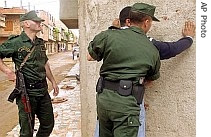| Cairo 12 April 2007 |
 Download
DownloadAlgeria's interior minister says the death toll from Wednesday's double car bombing in Algiers has risen to at least 33, with more than 220 people wounded. The attack has awakened fears that the country could slide back into the political violence of the 1990s. VOA Correspondent Challiss McDonough reports from our Middle East and North Africa bureau in Cairo.
Prime Minister Abdelaziz Belkhadem said the Algerian president led an emergency cabinet meeting and ordered what he called "a series of measures to end these criminal acts."
He gave no details of the measures.
The prime minister said the bombings were designed to drag Algeria back to "the crisis years."
The deadly attacks awakened fears that Algeria could return to the bloodshed of the 1990s, when a brutal civil war between government forces and Islamic extremists left some 200,000 people dead.
 |
| Algerian policemen search a young man as they perform security checks in a district of Algiers, 12 Apr 2007 |
"Politically, I think the greatest danger is that this is going to set back the process of transformation and of reforming the country," she said. "President Bouteflika has made considerable progress in the last few years in wrestling power from the military and putting it back in the hands of the civilian government. Of course, any return to terrorism, essentially, and to violence, is going to enhance the role of the military again."
The bombings in Algiers came just over a month before key parliamentary elections, which are expected to serve as a sign of Algeria's progress toward reform.
Ottaway doubts the bombers were trying to influence the outcome of the vote, but says the attack does seem aimed at shattering the growing sense of security. She says that alone will shift the balance of power toward the military.
"Now, I have trouble seeing how that plays into the hands of these terrorist groups," she added. "In other words, I am not sure that that is what they were trying to achieve, because it seems to me that the increased power of the military also means increased repression, increased violence used against them."
The first of the two bombings was particularly brazen, targeting the prime minister's office in the center of the capital. The second targeted a police station in an eastern suburb. Algeria's main Islamic militant group has claimed responsibility. It was formerly known as the Salafist Group for Preaching and Combat, but several months ago changed its name to the al-Qaida Organization in the Islamic Maghreb, and pledged allegiance to Osama Bin Laden and his terrorist network.
A series of recent attacks in the Algerian countryside and in neighboring Tunisia and Morocco have targeted mainly security forces and foreigners. In recent weeks, according to Algerian media reports, Algerian security forces have been conducting an intense campaign against al-Qaida militants in the region of Kabylie, east of the capital.
European analysts have expressed particular concern that the Algiers bombings could signify a resurgence in Islamic extremist militancy in North Africa, fearing it could potentially spill over into Europe, which has historically close ties with the Maghreb.
没有评论:
发表评论